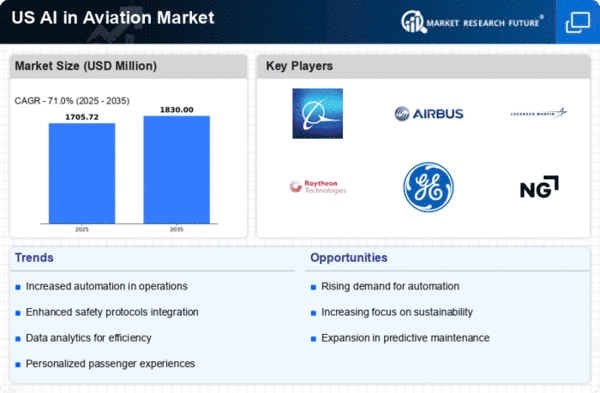Cost Reduction Initiatives
Cost reduction initiatives are a driving force in the ai in-aviation market, as airlines and service providers seek to mitigate rising operational expenses. The implementation of AI technologies can lead to substantial savings in various areas, including fuel management, maintenance, and customer service. For example, AI-driven predictive analytics can optimize fuel consumption, potentially reducing fuel costs by 10-15%. Additionally, automating customer service through AI chatbots can decrease labor costs while improving customer satisfaction. As the aviation industry continues to face financial pressures, the focus on cost reduction through AI solutions is expected to intensify, thereby propelling growth in the ai in-aviation market.
Data-Driven Decision Making
Data-driven decision making is becoming increasingly vital in the ai in-aviation market, as organizations leverage AI to harness the power of big data. The ability to analyze vast datasets allows airlines to make informed decisions regarding route planning, pricing strategies, and customer engagement. AI algorithms can identify patterns and trends that may not be immediately apparent, enabling companies to respond swiftly to market changes. This analytical capability is essential for maintaining competitiveness in a rapidly evolving industry. As more aviation stakeholders recognize the value of data-driven insights, the demand for AI solutions that facilitate this decision-making process is likely to grow, further shaping the ai in-aviation market.
Regulatory Compliance and Safety
Regulatory compliance and safety are paramount in the ai in-aviation market, particularly as the industry navigates complex safety standards. The Federal Aviation Administration (FAA) has been increasingly supportive of AI technologies that enhance safety protocols. AI systems can analyze flight data in real-time, identifying potential safety issues before they escalate. This proactive approach not only ensures compliance with stringent regulations but also fosters a culture of safety within aviation organizations. The market for AI-driven safety solutions is projected to grow significantly, as companies invest in technologies that can help them meet regulatory requirements while enhancing operational safety. This focus on compliance and safety is likely to drive innovation and investment in the ai in-aviation market.
Operational Efficiency Enhancement
The ai in-aviation market is experiencing a notable shift towards operational efficiency enhancement. Airlines and aviation companies are increasingly adopting AI technologies to streamline operations, reduce costs, and improve turnaround times. For instance, AI algorithms can analyze vast amounts of data to optimize flight schedules and crew management, potentially leading to a reduction in operational costs by up to 20%. This drive towards efficiency is crucial as the industry seeks to maximize profitability in a competitive landscape. Furthermore, the integration of AI in maintenance scheduling can minimize aircraft downtime, thereby enhancing overall fleet utilization. As a result, the ai in-aviation market is likely to witness a surge in demand for AI-driven solutions that facilitate these operational improvements.
Customer Personalization Strategies
Customer personalization strategies are increasingly influencing the ai in-aviation market, as airlines strive to enhance the passenger experience. By utilizing AI technologies, companies can analyze customer preferences and behaviors, allowing for tailored services and offerings. This level of personalization can lead to increased customer loyalty and satisfaction, which are critical in a competitive market. For instance, AI can recommend personalized travel packages or provide customized in-flight services based on individual passenger data. As airlines continue to prioritize customer-centric approaches, the integration of AI into personalization strategies is expected to expand, driving growth in the ai in-aviation market.

















